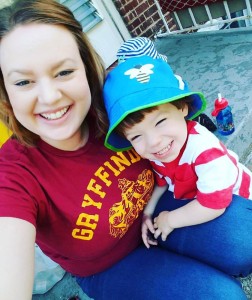The following is part of STYLE’s “Art Transplant” feature, which introduces artists who moved to Baltimore to hone their craft and find a creative community. Find more in coming weeks and in our September 2016 print issue.
Amber Wright knows what you think about the chances of having a successful career in theater (punishingly small), and she thinks you’re wrong.
“A lot of people were impressed that I was able to find a job in theater at all,” she says, “but theater’s definitely growing.” Wright, 23, studied theater at WVU, where professors were quick to challenge their students—because, as she explains, “you have to really want it to succeed in [theater]. If you don’t really want it, you should do something else.”
In the six months she’s been in Baltimore, Wright has found work stage-managing for Happenstance Theater, as well as her current gig as a house manager for Everyman. That she had a friend already on the scene to vouch for her may have helped—“It’s such a small group,” she says. “They like to know someone to make sure they’re good.”
As Wright has discovered, the small scale of Baltimore’s theater scene doesn’t affect the positive aspects of the culture. “I always find that the theater community is very accepting and friendly,” she says. “I was surprised at how tight-knit it is in Baltimore. I guess wherever you go the theater community is always going to be tight-knit.”
 By day, Wright also works as a nanny. Not only do the flexible hours allow her to build up her theater resume, working with children ties into her long term goal of working in youth theater. Having participated in theater programs throughout her school years, Wright understands how powerful the art form can be as an outlet for kids to learn how to express their emotions. During her own high school experience, theater became a crucial way to process her emotions after the death of her mother: “Before I was just doing it for fun, but after my mom passed away it was almost therapeutic to be part of a team.”
By day, Wright also works as a nanny. Not only do the flexible hours allow her to build up her theater resume, working with children ties into her long term goal of working in youth theater. Having participated in theater programs throughout her school years, Wright understands how powerful the art form can be as an outlet for kids to learn how to express their emotions. During her own high school experience, theater became a crucial way to process her emotions after the death of her mother: “Before I was just doing it for fun, but after my mom passed away it was almost therapeutic to be part of a team.”
Wright says that theater offers kids “a lot of benefits for kids in terms of self confidence, public speaking and expressing themselves. It can help kids grow empathy as they learn to put themselves in other people’s shoes.”
She aspires to develop youth theater programs as a tool for mental health that educates kids and helps them handle the often turbulent emotional waters of high school. As she says, “theater can be a way of expressing your emotions and also a way to learn about signs and symptoms of all types of problems.”
Since coming to Baltimore, Wright sees the possibilities of theater design to reflect and serve its local audience. Her own goal of producing theater that contributes to the health of its community is being acted out in Baltimore as theaters are working harder to respond to the needs of their diverse communities.“We’re trying to change theater to fit everyone.”





